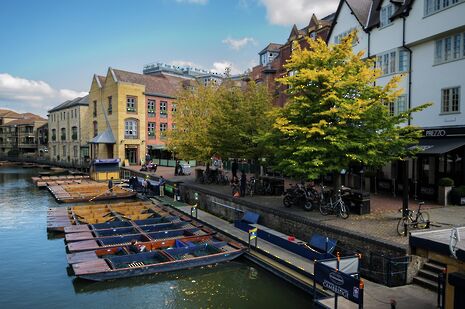Messing around with your degree
Haroon Mohamoud describes his experience of changing tripos

‘Jack of all trades, master of none’. My secondary school teachers can vouch for how pertinent a label that was for my schoolboy self. As with many of life’s truths, this same figure of speech can be found in different languages. The Hungarian one is particularly sharp: ‘He who grasps much, retains but little’.
At school, I was what teachers would call an ‘all-rounder’: my maths skills were respectable and my chemistry was proficient enough that I could tell a covalent bond from an ionic, but I obtained an Olympiad medal in neither subject; I could weave essays analysing fine pieces of English literature but it was clear I was no Wordsworth myself when it came to creative composition.
Unsurprisingly, my wide-ranging interests made choosing my A-level options a nightmare. In my last school report before GCSE exams, my headmaster admonished me for even thinking of continuing with the sciences and maths into the Sixth Form “on the basis of these grades!” When my exams in these subjects went better than expected, I challenged myself to actually try. Three months into Lower Sixth, I realised I was made neither for juggling ‘derivatives as dy/dx’, or the very painstaking business of calculating titres.
With a deferred place to study Classics during my gap year, alongside full-time work, I had the opportunity to study Arabic. Suddenly, I found myself absorbed in the ancient Semitic language – its grammar, and its large corpus of profound texts. I decided to give up my deferred place and apply for Arabic instead. However, by the time I was due to take up my place, I had become fairly familiar with the language. Would I manage to plough through four years of full-time study? Having read titles in Middle Eastern history by Hugh Kennedy and Albert Hourani, I rediscovered from my A-level days that history had a language of its own.
Frantic, I emailed my Asian and Middle Eastern Studies (AMES) Director of Studies to see if it was not too late to switch to History. I was asked to send in an essay and was invited for two interviews: one with the college Director of Studies for History and a History fellow, the other with the Senior Tutor. Although these were pretty straightforward, I spent the three days between the invitation and the actual date of the interview frantically pacing up and down, aimlessly trying to reground myself in the Russian history I’d studied at A-Level.
Unsurprisingly, the first interview with the History specialists began with a discussion of the essay, which deliberated over whether or not there was a transformation in the conditions of the Russian peasantry across Tsarist and then Communist regimes (1855-1964). In the meeting with the Senior Tutor, more of the discussion revolved around the circumstances of my sudden epiphany.
On my journey home that sunny September afternoon, I received an email to say my transition from AMES to History was approved.
Since I changed degree even before I had set foot in Cambridge, it did not really impact my life much on a personal level. Friendships had not been formed in the AMES faculty to be broken in favour of ones in the Faculty of History. King’s now had nine – as opposed to eight – first-year historians.
The History course is a year shorter, so I am due to graduate a year earlier than I would have originally - on condition that I do not change to another subject. For indeed, my manic subject grasshoppery might not be confined to History (excuse the pun!). As a penultimate-year student, I am now increasingly beginning to ponder what to do after I complete my degree.
I am already planning my forays into another new subject.
 News / Hundreds of Cambridge academics demand vote on fate of vet course20 February 2026
News / Hundreds of Cambridge academics demand vote on fate of vet course20 February 2026 News / University Council rescinds University Centre membership20 February 2026
News / University Council rescinds University Centre membership20 February 2026 News / Judge Business School advisor resigns over Epstein and Andrew links18 February 2026
News / Judge Business School advisor resigns over Epstein and Andrew links18 February 2026 News / Petition demands University reverse decision on vegan menu20 February 2026
News / Petition demands University reverse decision on vegan menu20 February 2026 News / Caius students fail to pass Pride flag proposal20 February 2026
News / Caius students fail to pass Pride flag proposal20 February 2026









